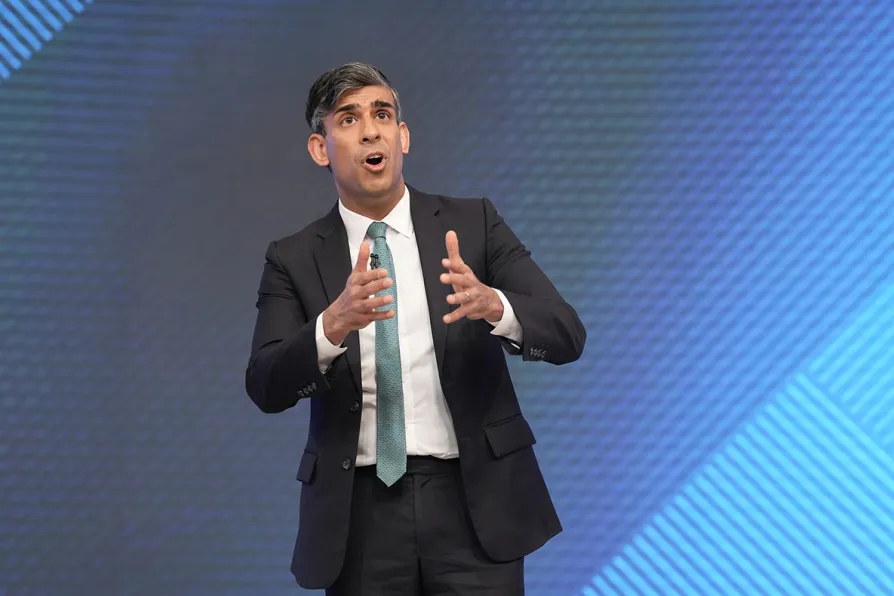
 Prime Minister Rishi Sunak launches the Conservative Party General Election manifesto at Silverstone in Towcester, Northamptonshire, June 11, 2024
Prime Minister Rishi Sunak launches the Conservative Party General Election manifesto at Silverstone in Towcester, Northamptonshire, June 11, 2024
WHEN Tories start warning that there is a danger to democracy it is time for the rest of us to start counting our spoons.
The Conservative Party is now at panic stations in the face of polls consistently putting it 20 points or more adrift of Labour. Rishi Sunak’s electoral offer of a return of conscription and abolishing National Insurance has failed to set the electorate alight it seems.
Certainly they have been insufficient to efface memories of 14 years of public squalor, working-class impoverishment, broken promises and blatant corruption.
Some are reading this polling deficit over into a Tory presence in the Commons shrunk to 70 seats or fewer. While implausible, Reform’s surge in support on the government’s right flank will have the impact of maximising Conservative losses.
Hence Defence Secretary Grant Shapps’s attempt to make the electorate’s flesh creep with talk of a Labour “supermajority” which would be “bad for democracy.”
To some extent this chatter is self-serving. It breeds at once complacency among Labour supporters and aims to consolidate non-Labour votes around Tory candidates.
It is also hypocritical. The Tories secured a huge majority in 2019 without Grant Shapps having conniptions. He would only have wished it larger still.
Finally it is ahistorical. Reviewing the post-war period, governments have secured immense, one hundred plus, majorities in 1945, 1983, 1997 and 2001 without democracy, such as it is, suffering a terminal blow.
Democracy is in fact menaced by what governments do, not by the number of MPs sitting on the opposition benches. With efficient whipping systems, legislation passes as easily with a majority of 20 as it does with 100 most of the time.
Thus the present government has used its parliamentary majority to restrict the right to protest, further erode the right to strike, diminish local government, protect undercover police abuses and indemnify crimes by the armed forces abroad.
The size of the Parliamentary Labour Party has been immaterial, since the Starmer leadership has not in fact opposed many of these measures. And we can be fairly sure that if a Starmer government trudges down the same authoritarian path, most Conservative MPs, however many there may be, will wave them through.
It is bipartisan consensus in support of Establishment politics — which are rejected by most of the population — that is the antithesis of genuine popular democracy. British policy towards the crisis in Gaza is an obvious example.
Both front benches have given full support to Israel’s genocidal attack on the Palestinians. Neither called for a ceasefire until the United States had given its qualified approval, both remain committed to arms sales to Israel.
Yet this is despite hundreds of thousands protesting in the streets for peace and in support of the Palestinians, and opinion polls showing very big majorities for a ceasefire.
Which parliamentarian sits on which bench is hardly the concern. For those with longer memories, it was the same when Blair wanted to launch his criminal aggression in Iraq — the Tories gave their full backing despite their sobriquet of “official opposition.”
Nor was there any significant parliamentary dissent from the neoliberal policies which led to the crash of 2008. Both governing parties had long been singing from the same hymn sheet.
So the post-July 4 parliamentary arithmetic is not a barometer of democracy’s health, although it may blight Shapps’s personal prospects. We will not be looking to the Conservatives in the Commons to check Starmer’s depredations, nor hold Labour ministers to account.
That can only be done by mass external pressure on the professional politicians as a caste. Democracy is in our own hands.

With turnout plummeting and faith in Parliament collapsing, BERT SCHOUWENBURG explains how radical local government reform — including devolved taxation and removal of party politics from town halls — could restore power to communities currently ignored by profit-obsessed MPs

JOE GILL looks at research on the reasons people voted as they did last week and concludes Labour is finished unless it ditches Starmer and changes course












